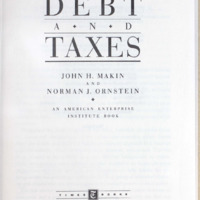-
Title
-
Debt and taxes
-
Description
-
No subject arouses - and perplexes - Americans more than debt and taxes. They are agreed about only one thing: they would like to rid themselves of both. It is a fantasy of course, as Benjamin Franklin knew when he observed in 1789 that "in this world nothing is certain but death and taxes." The only certainty Franklin neglected to mention was the lasting controversy that these confounding issues would always provoke.Debt and Taxes is a fresh look at America's budget mess by two of the country's most respected experts. John H. Makin, author of The Global Debt Crisis, and Norman J. Ornstein, an election consultant to CBS News and a contributor to The MacNeil/Lehrer NewsHour, provide a compelling and enlightening history of fiscal policy in the United States. They demonstrate how the political and economic aspects of the problem must be seen in broader patterns of ideology and philosophy. They trace our budget problems from the debate between Jefferson and Hamilton on how our government should work to the surprising struggles to formulate its policy. Most important, the authors examine where our policies are taking us, where they should be taking us, and how we can make our budget process more effective. The purpose of this book is to look behind he popular excitement over debts and deficits and to ask why and how we became entangled in our current predicament; how the fiscal struggles of the 1980s and early 1990s fit into historical patterns of political and economic thought concerning debt and taxes; and how much of the budgetary process is a real problem. Throughout the book, the authors take pains to place the subject in historical perspective. They point out that debate about the moral and political consequences of government debt, the power to tax, and the role of government itself lay behind both the Revolutionary War and the establishment of the republic. Sound fiscal policy was central to the Founding Fathers' philosophical and practical struggle over the direction that the new nation was to take. Debt and Taxes is an eye-opening - indeed, magisterial - account of the origins of the mechanisms of change and the belief in structural reform, of the competition between President and Congress, and of the philosophical and practical continuities, despite real and distinct changes, in public policy on taxing, spending, and debt. It is, as Senator Daniel Patrick Moynihan observes, "a clarifying, liberating book," one that all Americans should read.
-
Identifier
-
476071
-
081292312X
-
Creator
-
Mackin, John H
-
Contributor
-
Ornstein, Norman J
-
Source
-
Brian Lamb Booknotes Collection
-
Gift of Brian Lamb, 2011.
-
Catalog record
-
Language
-
eng
-
Date
-
1994
-
Program air date: March 13, 1994.
-
Publisher
-
Times Books
-
George Mason University. Libraries. Special Collections & Archives
-
Text
-
Transcription of Annotations
SC&A copy Booknotes 1994-03-13: Notes on front endpapers: Think tanks. David Stockman. Jude Wanniski. What are tariffs--when did we have the highest. Underlinings/notes: Lamb underlines passages relating to history of deficits, what comprise national obligations, conflicts in fiscal policies, the conflict between Jeffersonian visions and Hamiltonian realities; impact of major wars; economic depressions; reform. Notes: "System not failed...more sanguine about future." Highlights impact of each major war and presidents including: Jefferson, Roosevelt, Reagan. "Paralysis of the political will," "Kennedy civil rights v. tax policy,""Wars increased size of government," "1.Term limits--2. Line item veto--3. Balanced budget amendment."
-
Subject
-
"Fiscal policy--United States--History."
-
Relation
-
Original Booknotes interview
-
Rights
-
This work may be protected by copyright laws and is provided for educational and research purposes only. Any infringing use may be subject to disciplinary action and/or civil or criminal liability as provided by law. If you believe that you are the rights-holder and object to Mason’s use of this image, please contact speccoll@gmu.edu.
 476071.pdf
476071.pdf